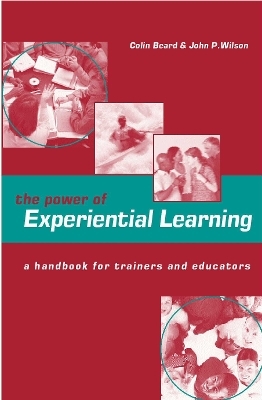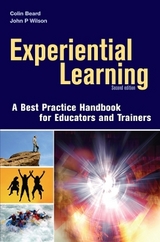
Power of Experiential Learning
Kogan Page Ltd (Verlag)
978-0-7494-3467-0 (ISBN)
- Titel erscheint in neuer Auflage
- Artikel merken
Experiential learning (learning by the use of activities whether outdoor or in an enclosed setting) is developing as a serious academic discipline and as a proven staff development technique. This handbook pulls together both the theory and practice of this wide-ranging approach that covers all types of learning that employ activity-based experience. Addressing outdoor training, office-based learning activities and the wide range of unusual techniques now being used on both sides of the Atlantic (using actors in training sessions, the structured used of reflection in the training and development cycle, and more), the book offers both a theoretical underpinning and detailed practical advice often pulled from workshop material. Making use of a simple-to-use but detailed Learning Combination Lock, the authors show that while there are no easy answers, there are vital ingredients that can be used to create new recipes for learning. Coupled with models to help, nurture, prepare, energize, engage, and support learners, the techniques can be used in management education, corporate training, youth development work or schools.
Colin Beard is recognized as a leading writer, thinker and practitioner on experiential learning. Originally training as a zoologist, Colin has a PhD in experiential learning and has extensive experience of a range of experiential fields of practice, including corporate learning and development, public and voluntary sector experience, outdoor learning, adventure education, nature therapy, and higher education. Colin has for many years worked with leading global companies advising and consulting on learning and development matters, particularly in the UK, Singapore, China and India. He is also a National teaching Fellow in the UK and a visiting professor at Derby University. He is a member of the editorial panel of a number of leading journals. He is the co-author and author of a number of best-selling books including Experiential Learning and The Experiential Learning Toolkit, both published by Kogan Page. John P Wilson teaches at Sheffield University Management School and is a tutor at the University of Oxford. His experience in education and consultancy spans a variety of countries and sectors, including aerospace engineering, banking, law and pharmaceuticals and he has worked with the United Nations Development Programme in Ethiopia and Nigeria. He is a Fellow of the Higher Education Academy and Fellow of the Chartered Institute of Personnel and Development (CIPD). He has written and edited a number of articles and books, including Experiential Learning, International Human Resource Development and The Call Centre Training Handbook, published by Kogan Page.
Part 1 Unlocking new combinations: Introduction; The tumblers; An overview of the chapters; Conclusion. Part 2 Exploring experiential learning: Introduction; Defining experiential learning; A meaningful experience; Learning is personal; Painful learning; Detrimental experiential learning; Learning from mistakes; Formal versus experiential learning; The lineage of experience learning; Experience as learning styles; A chronology of experiential learning; Challenging the concept of experiential learning; Conclusion. Part 3 The design milieu: Introduction; The milieu - activities, methods, techniques and materials; Planned or unplanned?; Innovation, activities, resources and objects - a simple experiential typology; Stimulating intelligence; Adventurous activities and journeys - challenge and risk; Sequencing the challenges; Mind challenges; Sensory stimulation; Change the rules and create obstacles; Constructing and using physical objects; Telling the story - using physical objects; Conclusion. Part 4 Exploring reality: Introduction; What is a real experience?; Fantasy; Play as experiential learning; Suspending reality - drama and role-playing; Metaphors and storytelling; Management development and cartoons; Creating comic strips - suggestions for good practice; Using photographic images and computer software; Reading and writing - reflections on reality; Conclusion. Part 5 Places and elements: Introduction; Indoor-outdoor, natural-artificial; Artificial urban environments; Pedagogy and personal development; The sensory power of nature; Empathetic strategies and the outdoor "cure"; Rafts or wildlife projects?; Eco-adventure and multiple learning; Sustainable development. Part 6 The emotional experience: Introduction; Emotion and experiential learning; The emotional nerve centre; The powerof the emotional state; Emotional waves; Experiencing emotional calm - sorting time; Ecstasy and peak learning; Experience, learning and "identity"; Spiritual feelings; Conclusion. Part 7 Working with emotions: Introduction; The emotional climate - mood setting and relaxed alertness; Overcoming emotion - fear; Mapping fears - accessing the inner family; Using trilogies in emotional work; Using humour and other positive emotions; Accessing emotions through popular metaphors; Metaphoric intervention; Conclusion. Part 8 Good practice and ethics: Introduction; The booming business; The deliverers; Facilitator roles; Intruding complicators or enabling animateurs; Dysfunctional and indigenous learning; Setting the climate and conditions. (Part contents.)
| Erscheint lt. Verlag | 15.12.2001 |
|---|---|
| Zusatzinfo | index |
| Verlagsort | London |
| Sprache | englisch |
| Maße | 142 x 234 mm |
| Themenwelt | Sozialwissenschaften ► Pädagogik ► Berufspädagogik |
| Wirtschaft ► Betriebswirtschaft / Management ► Personalwesen | |
| ISBN-10 | 0-7494-3467-8 / 0749434678 |
| ISBN-13 | 978-0-7494-3467-0 / 9780749434670 |
| Zustand | Neuware |
| Haben Sie eine Frage zum Produkt? |
aus dem Bereich



